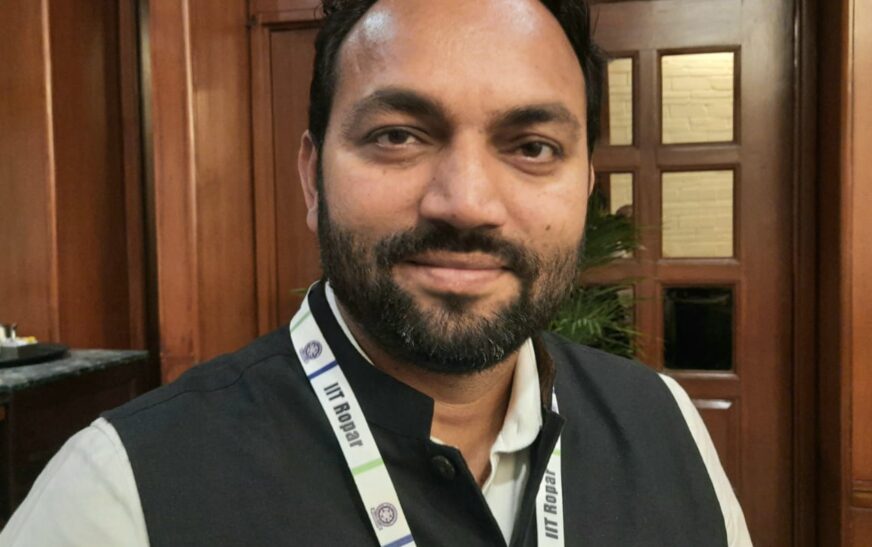India’s startup ecosystem surges ahead as a global innovation powerhouse. Driven by a young, digital-first population and strengthened by progressive government initiatives, it fosters bold, disruptive ideas across finance, healthcare, agriculture, food, education, emerging technologies, and deep tech. Startups are no longer confined to metros—Tier-2 and Tier-3 cities now fuel entrepreneurial ambition. Capital flows in. Mentorship grows. Infrastructure scales. As startups solve uniquely Indian problems, they also craft solutions with global relevance. Collaboration among academia, industry, and government sharpens this momentum. With each breakthrough, India doesn’t just participate in the innovation race—it leads it. The ecosystem thrives. The future belongs to the builders.
At the PRAGATI Founders Forum 2025, hosted by iHub-AWaDH at IIT Ropar, The Interview World engaged in an insightful dialogue with Dr. Pushpendra P. Singh, Dean of R&D at IIT Ropar and Project Director of iHub-AWaDH. In this exclusive conversation, Dr. Singh unpacks the current dynamics of India’s startup landscape, explores the disruptive impact of deep tech ventures in agriculture, and offers a comparative view of Indian startups vis-à-vis their global counterparts.
Moreover, he sheds light on the pathways through which Indian startups can scale their operations and evolve into global powerhouses. The following are the key highlights from his compelling and forward-looking conversation.
Q: How would you describe the current startup ecosystem in India, and what key trends or developments indicate its progress and future potential?
A: India is currently home to approximately 1.62 lakh startups. Yet, only a fraction of them operate in the deep tech space. In the agricultural sector, startups largely fall into two categories. The first focuses on value addition—enhancing efficiency and output across the value chain. The second bridges the gap between farmers and consumers, creating a direct and meaningful connection between the two.
However, the nation urgently needs a third kind—startups that leverage deep technology to drive transformative change. Today, India has just over 600 deep tech startups. Encouragingly, IIT Ropar alone incubates around 144 of them. This means our institute contributes nearly 25% of India’s total deep tech startup ecosystem—a remarkable share that underscores our leadership.
This dominance also fuels our conviction that the next green revolution—particularly in agritech—will emerge from Punjab, powered by institutes like IIT Ropar. Our belief is not without substance. The government has already invested close to ₹450 crore across two key programs: iHub AWaDH and Annam.ai, a Section 8 company we established six months ago.
Annam.ai is at the forefront of integrating cyber-physical systems with artificial intelligence to revolutionize agriculture. By embedding AI into the very fabric of farming, we’re laying the groundwork for smarter, more sustainable practices.
Looking ahead, India’s startup ecosystem is poised for exponential growth—especially in sectors like agriculture, which until recently remained on the periphery of innovation. Today, agriculture stands where IT stood 25 years ago: on the brink of disruption. With the right focus, investment, and technology, we are about to witness an agritech renaissance—one that will reshape the nation’s future from the grassroots up.
Q: What kind of transformative disruptions are deep tech startups poised to bring to the agriculture sector, and how might these innovations redefine traditional farming practices?
A: We have already begun transforming Indian agriculture through disruptive innovations. What we witnessed during the IT revolution 25 years ago is now unfolding in AgriTech—with equal, if not greater, intensity. This shift is critical, given our vast and growing population. India currently houses 1.4 billion people and is projected to reach between 1.5 and 1.6 billion by 2050. As a nation of this scale, ensuring food security demands a monumental increase in food production.
This is where deep tech startups step in as powerful catalysts. One of the most pressing challenges they can address is food waste. Today, we lose nearly 40% of what we harvest—an alarming statistic that reflects inefficiencies in our post-harvest and supply chain systems. In contrast, developed countries have significantly reduced food loss by implementing integrated and optimized supply chains. For us, this waste directly translates into economic loss and missed revenue opportunities. Consequently, we can expect a surge in startups dedicated to tackling food waste management.
Another critical frontier for innovation lies in pollination management. Over the past decade, natural pollinator populations—primarily insects—have plummeted by over 50% worldwide, driven by pollution, pesticide use, and environmental degradation. India has not been spared. If we fail to act now, the continued decline in pollinators will directly threaten crop yields and agricultural sustainability.
Thus, the emergence of startups focused on smart pollination is not just inevitable—it is essential. These ventures will play a vital role in developing technologies and systems to preserve, supplement, or even replicate natural pollination processes, ensuring productivity and resilience in the agricultural sector.
In summary, AgriTech is at the cusp of a revolution. With the right support, deep tech startups can solve structural challenges like food waste and pollination decline, paving the way for a more secure and sustainable food future for India.
Q: How do Indian startups compare with those in developed nations in terms of innovation, scalability, and global competitiveness?
A: Our startups stand on equal footing with those from developed nations. Having traveled extensively across the world’s leading economies, I have witnessed firsthand the innovation emerging from our entrepreneurial ecosystem. In fact, our startups are not just comparable—they often surpass their global counterparts in creativity and ingenuity. This relentless spirit of innovation positions them as true pioneers, challenging conventional boundaries and redefining what is possible.
Q: Despite the remarkable progress of Indian startups, what are the key challenges preventing them from scaling globally and evolving into large, globally dominant enterprises?
A: These startups will grow into major players. This is a journey that demands patience and persistence. Globally successful startups rarely explode overnight—they evolve steadily over time. When it comes to application and global acceptance, startups must build credibility gradually. Many of the world’s biggest startups began with humble origins, often pivoting from different industries. In contrast, our startups are mostly starting from scratch, forging their own paths without legacy support.
Take TCS, for example. It’s not a startup anymore but a colossal enterprise operating across IT, computing, and even agriculture. Calling TCS a startup would be inaccurate—it’s a testament to sustained success over decades. Similarly, we have numerous startups already generating significant revenue and making a mark in the market. However, these achievements don’t happen overnight.
What India urgently needs are more risk-takers willing to embrace uncertainty. Currently, many prefer the safety of steady jobs and fixed salaries, which limits entrepreneurial growth. Additionally, our startup ecosystem requires stronger nurturing infrastructure—better funding, mentorship, and support networks. While India boasts 1.4 billion people and around 160,000 startups, this number is not yet inspiring given the country’s size and potential. We must aim to increase that figure at least fivefold in the next two years.
When the startup base expands, the number of successful ventures will multiply. Even if only one percent of these startups become significant global players, that would still translate into a robust and vibrant ecosystem. I am optimistic by nature, and I firmly believe that India’s startup success story is still in its infancy. The coming years promise remarkable transformation, driving a true startup revolution across the nation.









